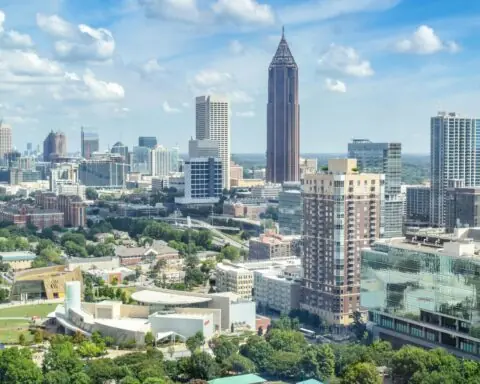Massachusetts Gov. Maura Healy has introduced the Mass Ready Act, which would authorize nearly $3 billion in bonds to strengthen infrastructure, protect Massachusetts communities against extreme weather events and prepare for disasters.
The announcement comes as the state recently completed a resilience project near Braintree Town Hall, which removed a dam to improve water access, natural restoration and community safety. Similarly, the proposed legislation seeks to fund future resilience projects that not only improve the state’s readiness for extreme weather but to further enhance economic opportunity.
While the bill will await state legislators’ approval, the Mass Ready Act focuses on five key areas: Infrastructure, Water and Nature, Permitting Reform, the Central and Western Regions of the state and Farms and Local Economies.
Strengthening Infrastructure
The new bill outlines strategies to protect homes, businesses and communities by improving crucial infrastructure, such roads, dams and bridges.
The state has seen sea levels rise, on average, over an inch per decade since the 1920s. This combined with increasing rainfall has made flooding increasingly likely to occur. The bill seeks to address these challenges through $308 million in bond authorizations that enhance flood protection efforts like improving high-risk dams, inland flood control systems, and coastal and marine infrastructure.
The Mass Ready Act also includes the following authorizations: ·
- $200 million to support ResilientCoasts recommendations.
- $587 million to invest in parks, trails, beaches, and historic sites.
- $177 million to improve transportation infrastructure such as bike lanes, greenways, and pedestrian bridges.
- $28 million to manage soil waste and decrease pollution.
Protecting Water and Nature
The Mass Ready Act would allocate funding to preserve water and natural resources by supporting projects that create access to safe drinking water, restore and maintain the quality of waterways and provide wildlife with vital habitats necessary for survival. Other projects include PFAS mitigation, critical clean water initiatives, land protection and support for the state’s Biodiversity Conservation Goals.
Housing and Environment Permitting Reform
The proposed legislation streamlines housing and infrastructure permitting timelines to reduce costs and advance critical projects by simplifying the process, cutting redundant reviews and improving coordination. This new pathway impacts priority housing, natural restoration projects and urgent infrastructure needs, such as municipal culvert replacements. It also ensures buildings can withstand future conditions, are energy efficient, have access to transit and minimize impact on the environment. Specific permitting reform is as follows:
- Allowing priority housing and restoration projects to receive a Chapter 91 license in just 60 days without triggering review under the Massachusetts Environmental Policy Act (MEPA).
- Cutting duplicative administrative appeals for wetlands regulations, allowing local appeals for these project categories to go straight to the superior court.
- Adding climate resilience as a goal of the Wetlands Protection Act, simplifying permitting for natural restoration projects.
- Removing the Environmental Impact Report (EIR) requirement for priority housing and natural restoration projects, allowing for completion of MEPA review within 30 days rather than up to one year.
The Mass Ready Act also reauthorizes $50 million for the Momentum Fund to continue the accelerationof mixed-income and multifamily housing developments. It also requires disclosures of flood risk and past damages during home sales and lease signings, so renters and buyers can make informed decisions and avoid costly damages. The legislation also equips the Board of Building Regulations and Standards to advance climate resilience and housing production through state building codes.
Supporting Western and Central Massachusetts
- $308 million to manage state-owned or abandoned dams and inland flood control systems that are considered high risk.
- $93.5 million to manage municipal and publicly owned dams as well as inland flood control infrastructure and nature-based solutions to enhance climate resilience.
- $30 million for forestry and tree planting programs.
Investing in Local Economies
The legislation outlines proposed investments in food security, climate-smart agriculture, land and water conservation, and coastal economies. Furthermore, it seeks to ensure access to fresh, locally sourced food, help municipalities prepare for climate challenges, support tree planting and create more parks and recreational spaces.
The Mass Ready Act also establishes a Resilience Revolving Fund which will help cities, towns, tribal governments and water and wastewater districts invest in resilience projects. Thefund will offer low-interest loans to improve stormwater systems, reduce flood risk and strengthen other critical infrastructure. The Resilience Revolving Fund will complement other authorizations for local projects including:
- $315 million to the Municipal Vulnerability Preparedness (MVP), which supports communities in identifying climate hazards, assessing vulnerabilities and implementing action plans to improve resilience to extreme weather events.
- $125 million to the Food Security Infrastructure Grant (FSIG) program which offers funding to ensure that farmers, fisherman and other local food producers are better connected to a strong food system.
- $68 million for the Massachusetts Department of Agriculture (MDAR) to protect farmland, foster food security and sustain agricultural economic viability.
Other projects under this category will focus on preserving open spaces, restoring water sheds, supporting outdoor recreation, and keeping agriculture financially stable.
If approved, the Mass Ready Act would represent a historic investment in state land acquisition, authorizing $340.5 million in bond funds for restoration and stewardship efforts. Additionally, $20 million would be dedicated to the planning and implementation of projects and programs born from Executive Order 618, Biodiversity Conservation in Massachusetts. The full Mass Ready Act legislation as well as key issue briefs are available on the state’s website.
Photo by C.C. Henry from Pexels














